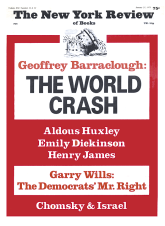In response to:
Report from the Field from the November 28, 1974 issue
To the Editors:
May I be permitted a short reply to Professor Gluckman’s rather vindictive and certainly imaginary “Report From the Field” (NYR, November 28)?
Like Leach’s initial review (NYR, April 4; see Diamond’s penetrating critique, NYR, October 17), Gluckman’s self-betraying pique amounts to a motivated diversion. The crucial issue is hardly whether he was serious or joking about His Majesty’s service. (If he was joking, as he now claims, he was hiding a broader truth under a strained quip. As for Gluckman’s other attributions and descriptions, they are merely anecdotal, embarrassingly self-serving, and quite inaccurate.) His entire focus is evidently meant to deflect from the only significant issue in this debate: the substantial involvement, both direct and indirect, of British social anthropology in aiding and abetting British colonial policy in Africa.
Gluckman would have us believe that he is an exception to the rule; that he is different from Malinowski, Radcliffe-Brown, Evans-Pritchard, Audrey Richards, S. F. Nadel, and countless others. He isn’t.
The Rhodes-Livingstone Institute (RLI) was an “independent public charity” in name only. In fact, it was initiated by the Rhodesian government (apparently in response to the Copperbelt rebellion of 1935), funded by it, by the mining companies, the British South Africa Company, the Rhodes and Beit Trusts, and later the Colonial Development and Welfare Trust. The Board of Trustees was presided over by the Governor with veto power over all decisions. No scientists were initially included in the governing board.
Contra Gluckman, the Board did initiate research: at first the “mapping” of colonial territories as a guide for administrators; subsequently, at the request of the Rhodesian government, research on land-tenure in cooperation with the Agriculture Department.
All in all, the raison d’être for the RLI was to study the effects of industrialization (especially mining) on the lives of the peoples providing cheap labor for the exploiting companies. Anthropological information, it was hoped, would insure a docile native population, a superior settler cast, and continued profits for British business interests (see Richard Brown, “Anthropology and Colonial Rule,” in Talal Asad [Ed.], Anthropology and the Colonial Encounter, London: Ithaca Press [1973]; Daryll Forde, “Applied Anthropology in Government: British Africa,” in A. L. Kroeber [Ed.], Anthropology Today, Chicago: University Press [1953]; or Jack Stauder, “England: Functionalism Abroad: The Anthropology of Imperialism,” in Stanley Diamond (Ed.), Ancestors and Heirs, The Hague: Mouton [In Press]).
Gluckman assures us of his “objectivity.” The Government, he says, did not have to approve of his research. Indeed it did not. The technical information forthcoming from the RLI was more than adequate for its reactionary purposes. The first director of the RLI, the illustrious Godfrey Wilson, expressed the gentlemenly accommodation between scholars and exploiters perfectly: “It is the scientists’ business to undertake … patient and objective study, it is the business of government and industry to make use of their results in fashioning out of the present whatever future they desire” (Wilson in Forde, op. cit., p. 858). As Fanon observed, “For the colonized person, objectivity is always directed against him” (Fanon in A. Wilden, System and Structure, p. xxiii, London: Tavistock [1973]).
Given the above, Gluckman’s appeal to his “left-wing” politics is unconvincing. While in Rhodesia, he catalogued and analyzed a colonial and exploitative situation with privileged objectivity. He thus added to the documentation and the knowledge required for the effective subjugation of native peoples. Once safely back in Manchester, he has the audacity to speak on their behalf. What noblesse oblige! The White Man, indeed, speaks with a forked tongue.
In terms of Gluckman’s immediate situation, his pious protestations are touching, if symptomatic. He has always been an ambivalent, even “outside” member of the now fading Oxbridge anthropology club. Yet he is nonetheless a member, trapped in its academic conventions, compelled to rationalize Leach’s bad-faith through the invention and retailing of gossip.
Bob Scholte
Philadelphia, Pa.
This Issue
January 23, 1975



